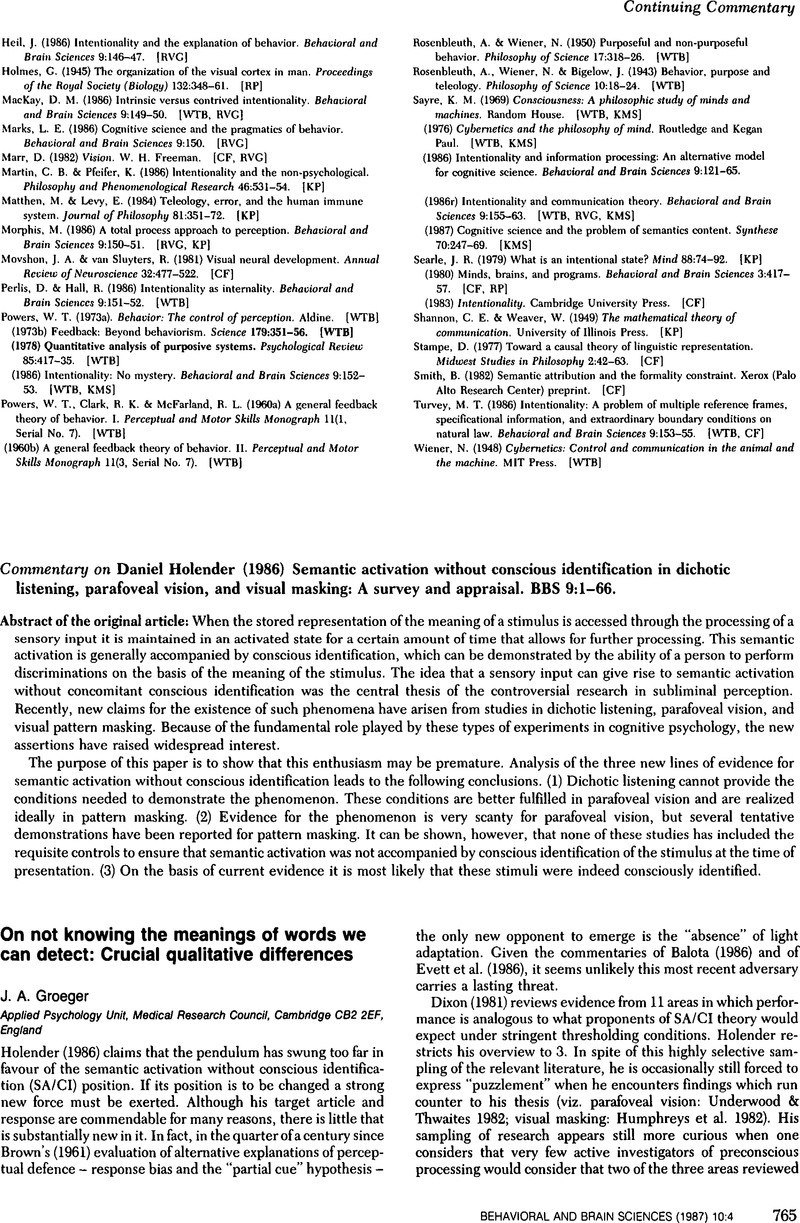Crossref Citations
This article has been cited by the following publications. This list is generated based on data provided by Crossref.
Uleman, James S.
and
Uleman, Jennifer K.
1990.
Unintended thought and nonconscious inferences exist.
Behavioral and Brain Sciences,
Vol. 13,
Issue. 4,
p.
627.
Czyzewska, Maria
Hill, Thomas
and
Lewicki, Pawel
1990.
The ability versus intentionality aspects of unconscious mental processes.
Behavioral and Brain Sciences,
Vol. 13,
Issue. 4,
p.
602.
Rosenthal, David M.
1990.
On being accessible to consciousness.
Behavioral and Brain Sciences,
Vol. 13,
Issue. 4,
p.
621.
Dreyfus, Hubert L.
1990.
Searle's Freudian slip.
Behavioral and Brain Sciences,
Vol. 13,
Issue. 4,
p.
603.
Harman, Gilbert
1990.
Intentionality: Some distinctions.
Behavioral and Brain Sciences,
Vol. 13,
Issue. 4,
p.
607.
Clark, Andy
1990.
Aspects and algorithms.
Behavioral and Brain Sciences,
Vol. 13,
Issue. 4,
p.
601.
Piattelli-Palmarini, Massimo
1990.
Somebody flew over Searle's ontological prison.
Behavioral and Brain Sciences,
Vol. 13,
Issue. 4,
p.
618.
Zelazo, Philip David
and
Reznick, J. Steven
1990.
Ontogeny and intentionality.
Behavioral and Brain Sciences,
Vol. 13,
Issue. 4,
p.
631.
Taylor, Charles
1990.
The possibility of irreducible intentionality.
Behavioral and Brain Sciences,
Vol. 13,
Issue. 4,
p.
626.
Kulli, John C.
1990.
Is Searle conscious?.
Behavioral and Brain Sciences,
Vol. 13,
Issue. 4,
p.
614.
Velmans, Max
1990.
Is the mind conscious, functional, or both?.
Behavioral and Brain Sciences,
Vol. 13,
Issue. 4,
p.
629.
Hodgkin, Deborah
and
Houston, Alasdair I.
1990.
“Consciousness” is the name of a nonentity.
Behavioral and Brain Sciences,
Vol. 13,
Issue. 4,
p.
611.
McDermott, Drew
1990.
Zombies are people, too.
Behavioral and Brain Sciences,
Vol. 13,
Issue. 4,
p.
617.
Bridgeman, Bruce
1990.
Intention itself will disappear when its mechanisms are known.
Behavioral and Brain Sciences,
Vol. 13,
Issue. 4,
p.
598.
Searle, John R.
1990.
Consciousness, explanatory inversion, and cognitive science.
Behavioral and Brain Sciences,
Vol. 13,
Issue. 4,
p.
585.
Rey, Georges
1990.
Constituent causation and the reality of mind.
Behavioral and Brain Sciences,
Vol. 13,
Issue. 4,
p.
620.
Underwood, Geoffrey
1990.
Conscious and unconscious representation of aspectual shape in cognitive science.
Behavioral and Brain Sciences,
Vol. 13,
Issue. 4,
p.
628.
Matthews, Robert J.
1990.
Does cognitive science need “real” intentionality?.
Behavioral and Brain Sciences,
Vol. 13,
Issue. 4,
p.
616.
Dresher, B. Elan
and
Hornstein, Norbert
1990.
Language and the deep unconscious mind: Aspectualities of the theory of syntax.
Behavioral and Brain Sciences,
Vol. 13,
Issue. 4,
p.
602.
Skarda, Christine A.
1990.
The neurophysiology of consicousness and the unconscious.
Behavioral and Brain Sciences,
Vol. 13,
Issue. 4,
p.
625.


